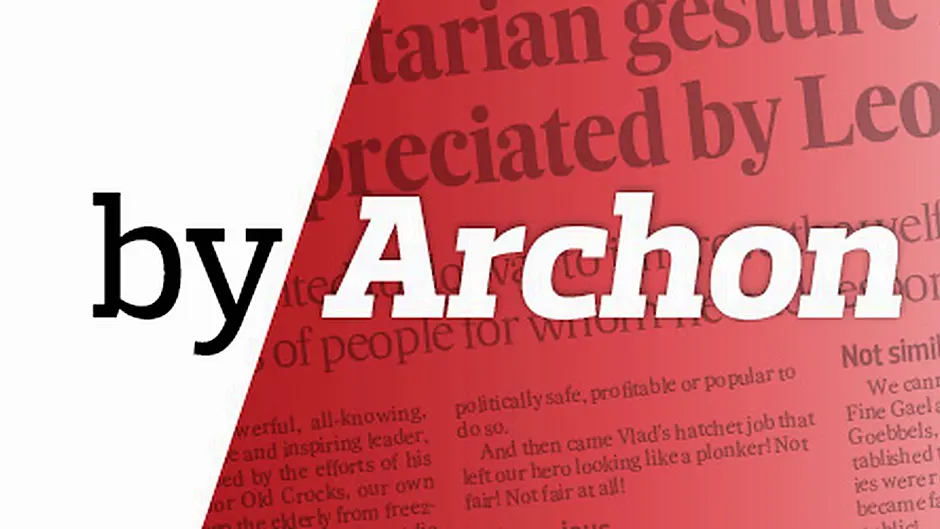Oh dear! The news is bad, but we must report it. Minister Simon Coveney's shifty and evasive position on abortion has created such problems
OH DEAR! The news is bad, but we must report it. Minister Simon Coveney’s shifty and evasive position on abortion has created such problems that his political future might well be heading for an unfortunate and inescapable termination.
Nothing better illustrates the sad turn of events than his latest effort to wriggle from the anti-abortion hook on which he had impaled himself.
Having been the main pro-life voice at the Cabinet table, opposing the 12-week time frame during which women could abort without restriction, last week he experienced an opinion changing miracle.
He had discussions with unnamed ‘senior clinicians,’ who converted him to the notion that if people voted ‘Yes’ in the Referendum, his government would be able ‘to get the balance right and protect women in the appropriate way.’
As the Plain People of Ireland tried to come to terms with such an impenetrable explanation, the intricacies of the controversy that his conscience had wrestled with for months seemed to resolve themselves.
He discovered a formula of words that would convince the punters that he was opposed to unrestricted access to abortion, and yet for it.
Archimedes’ principle
The ‘Eureka’ moment might well have happened while having a cup of cocoa and a Marietta biscuit. We don’t know, but the enlightenment was worthy of Archimedes’ reputed ‘eureka’ exclamation when the philosopher discovered the principle of buoyancy.
Simon and Archimedes both experienced a wonderful flash of intuition that (like all great ideas) was simple enough for the common folk to understand.
It was this: on the one hand, he would support a law that allowed access to abortion up to 12 weeks ‘if it’s coupled with strict medical guidelines’ and, on the other, he would demand that a two-thirds Dáil majority would be needed for any further changes to Ireland’s abortion laws.
Coveney had in mind a sort of ‘legal lock’ that he said he wanted introduced in return for supporting Varadkar’s changes to the Constitution.
It would be a defence mechanism to ensure abortion legislation could not be easily altered in the future.
His two-thirds-Dáil-majority plan was in response to ‘unfair’ accusations that the Oireachtas could not be trusted in the event of other ‘abortion adjustments’ that might be coming down the line (For instance, it is expected that immediate attempts will be made to change the legislation from 12 weeks to 10 weeks if the 8th Amendment is repealed),
He explained that a two-thirds Dáil majority effectively meant that more than the combined strength of Fianna Fáil and Fine Gael in the present Dáil would be required.
In other words, he promised no ‘creeping change.’ Everything would be under Dáil control and, natch, his unhappy supporters in Cork South Central would swing back towards him in a collective wave of praise and support of his inventive skills.
Mice and men
But, sadly, ‘the best laid plans of mice and men often go astray.’ Simon’s peers in Dáil Éireann denounced his ingenious stratagem as ‘pathetic,’ ‘incoherent,’ ‘unworkable,’ ‘unnecessary,’ ‘naïve,’ ‘not a flier’ and ‘a danger to the yes vote’!
He was savaged, not only by the Pro-Lifers, but also by his own crowd.
And why? Because he had ignored completely that slim collection of fundamental principles by which Ireland is governed: Bunreacht na hÉireann, the Constitution.
Sinn Féin’s leader, Mary Lou McDonald, could not conceal her amazement: ‘How on earth can you propose something that clearly contradicts the Constitution?’ she asked in a shell-shocked fashion.
A smirking Mattie McGrath observed toothsomely: ‘even a transition-year schoolboy would know your idea is completely unconstitutional.’
And then his Boss, ‘Vlad’ Varadkar, failed to back him. ‘it could not be and will not be included, as doing so would require another constitutional amendment,’ uttered the Great Man sharply.
Tánaiste advisers
Even Blueshirt comrades cruelly sneered in the corridors of Leinster House” ‘He’s gone from hero to zero,’ they joked.
But, one asks, where were the Tánaiste’s ‘advisers,’ that cadre of special people who earn in excess of €130,000 to make sure such embarrassing mistakes do not occur?
Did they discuss his plan? Did they ‘advise’ him of the political damage he was about to inflict on himself?
Or, was it possible that they, like Coveney, were not acquainted with Article 46 of the Constitution and, consequently, unable to offer a word of caution?
So, in the interests of enlightening Mr Coveney’s wealthy retainers and attendants, we offer – completely free of charge and with no strings attached – the main points of Article 46 of the Irish Constitution:
1. Any provision of this Constitution may be amended, whether by way of variation, addition, or repeal, in the manner provided by this Article.
2. Every proposal for an amendment of this Constitution shall be initiated in Dáil Éireann as a Bill, and shall upon having been passed or deemed to have been passed by both Houses of the Oireachtas, be submitted by Referendum to the decision of the people in accordance with the law for the time being in force relating to the Referendum.
3. Every such Bill shall be expressed to be ‘An Act to amend the Constitution.’
4. A Bill containing a proposal or proposals for the amendment of this Constitution shall not contain any other proposal.
As far as this scribe is aware, only on two occasions were changes made to the Constitution without a Referendum. The first was in 1939 on the outbreak of the Second World War when the constitutional definition of ‘time of war’ was extended to include a period during which the State was not a direct participant. It allowed for the government to introduce emergency powers.
The second amendment was passed in 1941, clarifying that emergency powers had to be within ‘the time of war,’ but specifying that a ‘time of war’ could extend beyond the termination of hostilities.
So, the fact of the matter is that Article 46 of the Constitution is unambiguous: all amendments to the Constitution must be put to a Referendum, not to a two-thirds Dáil majority, as Coveney proposed.
For an experienced legislator who is the deputy head of government and the second-most senior officer in the government, Coveney’s ‘gaffe’ was inexcusable (if gaffe it was).
After all, it is his duty and responsibility to make laws within the context of the Constitution.
A cynical ploy?
Indeed, some critics argue that as an experienced politico, versed in the Constitution, Coveney’s plan was nothing more than a cynical ploy to deflect attention from his soapy abortion principles and his readiness to dump them.
In a properly-functioning democracy he would have resigned on having been rumbled, but unfortunately, this country doesn’t do resignations.
Erring politicians simply grit their teeth and stay on, despite the fact that they’re bringing our democratic institutions into disrepute. As did Coveney!







